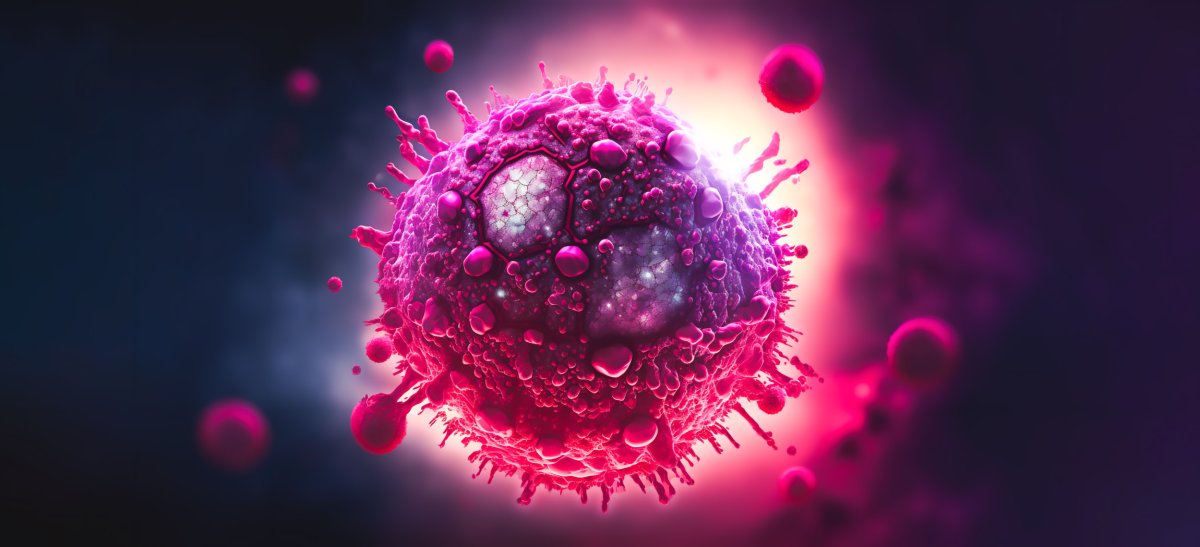We might be a step closer to curing HIV, as researchers have developed a way to knock out a version of the virus lurking in the body.
Using something called an HIV-like particle (HLP)—which are dead HIV particles containing HIV proteins that trigger an immune response in a patient—may help treat the disease, scientists from the University of Western Ontario's Schulich School of Medicine and Dentistry and the U.K.'s University of Bristol reveal in a paper in the journal Emerging Microbes & Infections.
HLP was found to be 100 times more effective at treating the virus in people living with chronic HIV while on combined antiretroviral therapy (cART) than other candidate HIV cure therapeutics.

HIV, or human immunodeficiency virus, attacks the immune system, specifically targeting CD4 cells, which are crucial for helping the body fight infections and diseases. Without treatment, HIV can progress to the more advanced stage called AIDS, which can lead to death in only a few years.
More than 1.2 million people across the U.S. have HIV, with over 30,000 new cases diagnosed every year. There is no cure for HIV, but several treatments are available that can allow patients to live a long life.
HIV is treated primarily with cART, which is a combination of medications designed to suppress the replication of HIV in the body. This therapy works by targeting different stages of the HIV life cycle, preventing the virus from multiplying and reducing its levels in the bloodstream.
The goal of cART is to reduce the viral load (the amount of HIV in the blood) to undetectable levels, allowing the immune system to recover and preventing the progression of HIV to AIDS. However, cART doesn't completely eliminate the virus from the body, and the virus creates a "latent reservoir" where it hides within the cells of the body, lying dormant.
According to the new paper, HLP can help to purge cells of this latent HIV, making it a major step forward in treating and curing the infection.
"The development of this HIV cure was ten years in the making but with strong support from our collaborators in the US, Canada and Uganda, we have observed a striking ability of HLP to drive out the last remnants of HIV-1, which we hope will provide an affordable cure for all," said Eric Arts, the Canada research chair in HIV pathogenesis and viral control at the Schulich school, in a statement.
"To live HIV-free is a goal for the 39 million infected. It is also the priority of the UN and WHO to end the HIV pandemic by 2030," he added.
HLP, a deactivated version of HIV, contains various proteins that make it recognizable to the body as the virus, triggering an immune response. But it doesn't contain any of the structures that make the virus harmful and immunocompromising. HLP can therefore trigger the immune system to go hunting after HIV viruses remaining in the body, including the latent viruses hidden inside the immune cells. This allows the body to "shock and kill" the hidden viruses, the researchers said in the paper.
The researchers used blood samples from 32 patients with chronic HIV from the U.S., Uganda and Canada who had been on stable cART for a median of approximately 13 years. They found that HLP was able to specifically target just the immune cells containing a latent HIV reservoir, removing the virus from the cells.
"Over time, the virus grows more diverse within a single individual that is not on treatment which makes it more difficult to target," co-author Ryan Ho, a master's student at the Schulich school, said in the statement. "This formulation we've crafted covers the theoretical diversity so it can reach the HIV-1 in all those people living with HIV."
This is an extremely exciting discovery for HIV researchers, as it could be combined with cART and one day lead to the total elimination of HIV from the bodies of patients.
Minh Ha Ngo, the paper's lead author and a postdoctoral scholar at the Schulich school, said in the statement: "One concern expressed among people living with HIV for years is that continued use of cART could lead to the virus becoming unreachable and unable to be eliminated.
"The results of this study, by contrast, demonstrate that combining HLP with cART is still able to trigger the latent reservoir, even in chronic cases. If these dormant latent reservoirs can be awakened, then they can be eliminated from the body," Ngo said.
Additionally, HLP appeared to work on all variants of HIV from around the planet, indicating that it could be successful at treating even mutated versions of the virus.
"Owing to its high mutation rate, HIV exhibits remarkable genetic diversity, resulting in different viral subtypes, some of which predominate in particular regions of the globe," said Jamie Mann, a senior lecturer in vaccinology and immunotherapy at the University of Bristol's Veterinary School, in the statement.
"We were excited to see preliminary evidence that our HLP cure therapy reverses latency irrespective of the subtype of the individual's infection. Whilst this needs to be explored further, it hints at the global applicability of our approach," Mann said.
The researchers hope to test this HLP treatment across a larger cohort of people around the world to determine if it is an effective treatment strategy for those with both chronic and acute HIV.
Do you have a tip on a science story that Newsweek should be covering? Do you have a question about HIV? Let us know via science@newsweek.com.
Uncommon Knowledge
Newsweek is committed to challenging conventional wisdom and finding connections in the search for common ground.
Newsweek is committed to challenging conventional wisdom and finding connections in the search for common ground.
About the writer
Jess Thomson is a Newsweek Science Reporter based in London UK. Her focus is reporting on science, technology and healthcare. ... Read more
To read how Newsweek uses AI as a newsroom tool, Click here.








